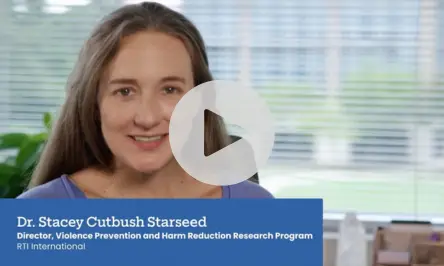A diverse, multidisciplinary approach to address the complexities of human trafficking crimes.
Central to the mission of RTI’s human trafficking research and training and technical assistance (TTA) is the imperative to incorporate the expertise of people with lived experience of human trafficking. Within our team, subject matter experts—with training in criminology, public health, social work, and psychology—regularly collaborate on research, evaluation, and TTA projects that advance our understanding of sex and labor trafficking exploitation, the systems that enable trafficking, and evidence-informed strategies to improve a multi-sector response to these crimes.
Project Highlight
Outcomes for Human Trafficking Survivors
Through NIJ grant funding, RTI developed the Outcomes for Human Trafficking Survivors Instrument (OHTS): a free, Microsoft Excel-based tool that service providers can use to objectively and comprehensively evaluate outcomes among human trafficking survivors. The OHTS was developed to support comprehensive service programs for survivors of human trafficking. This instrument documents the status of program participants (clients) in outcome categories related to safety, well-being, social connectedness, and self-sufficiency. Programs can use the OHTS at a single point in time to describe clients’ strengths and vulnerabilities and to support case management. Programs can also use the instrument over time to evaluate outcomes by assessing areas in which clients are making progress, losing ground, or maintaining. Finally, programs can use this instrument to document program-level impact and identify service domains in need of greater emphasis. Outcome data from the OHTS complements other data that service programs may collect. This includes client characteristics (demographic data), service needs, and services delivered (outputs). Programs can use outcome data in several ways: to inform case management and data-driven program development; to identify resource gaps, and to communicate program successes to stakeholders and funders. The OHTS Instrument, OHTS User Guide, and OHTS Development Brief are free to access.

Project Highlight
Human Trafficking Policy and Research Analyses Project
Questions around effective strategies to prevent and respond to human trafficking guide this project, in partnership with the Administration for Children and Families’ (ACF) Office of Planning, Research, and Evaluation (OPRE) and the Office on Trafficking in Persons (OTIP). The Human Trafficking Policy and Research Analyses Project advances the scope of knowledge and data around human trafficking by identifying priority areas for learning, and conducting a series of studies that can immediately impact practice. These projects include a field test of two sampling methods to measure the prevalence of labor trafficking within the construction industry, the creation of a Learning Agenda for OTIP, a formative evaluation of the Demonstration Grants to Strengthen the Response to Victims of Human Trafficking in Native Communities, a process evaluation of the Human Trafficking Youth Prevention Education Demonstration Grant Program, and an exploration of how to improve economic empowerment programs for people who have experienced human trafficking.
Project Highlight
Identify, Respond, Prevent: Addressing Human Trafficking among Juvenile Justice– and Child Welfare–Involved Youth
Minor and youth victims of human trafficking are identified and served in both child welfare systems and juvenile justice systems. However, little is known about the similarities and differences between children involved in just one system or both. This NIJ-funded study uses linked administrative data for children born after 1993 from Florida’s Department of Children and Families, Florida’s Department of Juvenile Justice, and the Florida Department of Law Enforcement. Data from 1993 to early 2020 were analyzed in efforts to address research questions related to 1) the predictive utility of Florida’s Human Trafficking Screening Tool among justice-involved youth; 2) the characteristics and system involvement of youth who are child-welfare-involved, justice-involved, or dual-system involved; 3) youth characteristics, as well as any prior child welfare and/or juvenile justice experiences that predict an initial human trafficking allegation, and subsequent allegations; and 4) the relationship between any human trafficking allegations among system-involved youth and subsequent involvement in the adult criminal legal system. Findings will inform trafficking identification among system-involved youth; responses to trafficked youth; primary, secondary, and tertiary prevention of trafficking among system-involved youth; and our understanding between trafficking victimization among system-involved youth and subsequent adult criminal involvement.
Project Highlight
Understanding What Works in the Successful Identification, Investigation, and Prosecution of Labor Trafficking Cases in the United States
Despite continued commitment by federal and local government stakeholders, law enforcement, and community-based advocates and victim service providers, cases involving labor trafficking are rarely identified at the state and local level. This project, funded by the National Institute of Justice (NIJ) examines the elements of labor trafficking cases that have been successfully identified and considers how the approach to identifying and responding to labor trafficking may need to be differentiated from the approaches that have been developed to address sex trafficking. This study takes into consideration the ways that sex and labor trafficking investigations, within the same jurisdictions, differ in terms of case characteristics, investigative strategies, and professional backgrounds of those involved in investigations. The aim of this study is to better understand the elements of labor trafficking investigations and the ways in which these cases should be treated as distinct from sex trafficking cases.
Project Highlight
Improving Outcomes of Child and Youth Victims of Human Trafficking
This Office for Victims of Crime (OVC) training and technical assistance (TTA) project supports grant recipients funded to implement multidisciplinary and statewide approaches to improving outcomes for children and youth who are victims of human trafficking. RTI’s approach includes collaborative relationships with OVC-funded Improving Outcomes grantees. The Improving Outcomes for Child and Youth Victims of Human Trafficking: Compendium of Resources is a compilation of resources provided by Improving Outcomes grantees funded from 2016 through 2019. Learn more about Improving Outcomes state-based approaches to address child and youth trafficking.
Project Highlight
Estimating Sex Trafficking in Sacramento County, California
State and local law enforcement, community-based advocates, victim service providers, policymakers, and the general public are largely committed to addressing sex trafficking in their communities. However, one of the central questions that stakeholders often ask in considering the appropriate intervention and response to sex trafficking is: how big is the problem, and what does it look like here? Understanding the scope and nature of sex trafficking in a city is an important first step toward mobilizing efforts to identify and provide services to trafficking survivors. Guided by a participatory research approach and funded by the California Department of Justice, this project provides the first estimate of sex trafficking in Sacramento County.
Just Response To Human Trafficking In Native Communities
Related Projects
Labor Trafficking in Construction and Hospitality
Read More about Labor Trafficking in Construction and Hospitality










